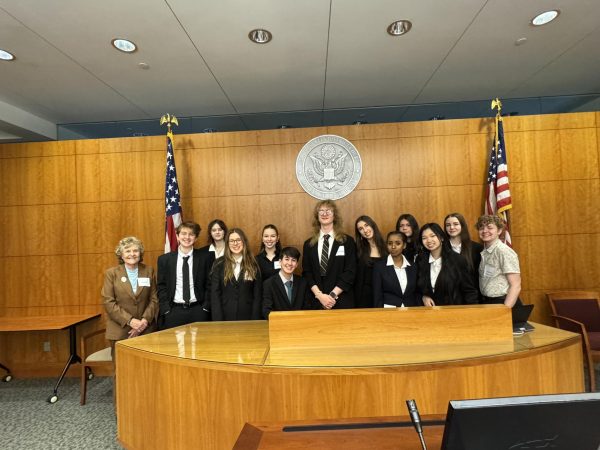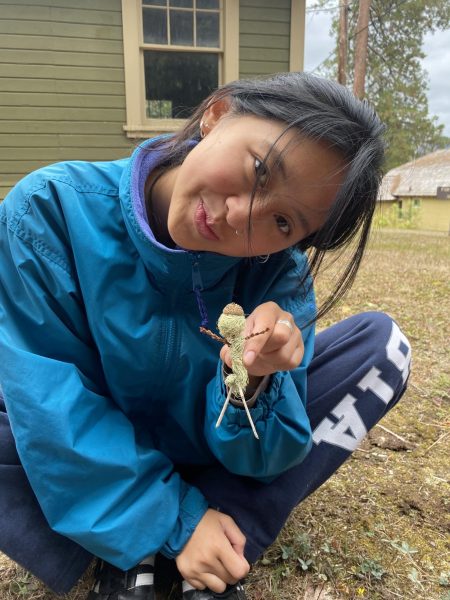
All three of Franklin’s mock trial teams are fresh from a commendable performance at the Civics Learning Project’s Oregon High School Mock Trial State Competition. On the weekend of March 15, 2025, Franklin’s three mock trial teams competed against dozens of other schools at Portland’s federal courthouse, participating in life-like court simulations.
Franklin’s mock trial program consists of three teams, comprised of sophomore to senior students. Every team has a mixture of students, each of whom takes on different roles as “attorneys” and “witnesses.” Together, they work to prepare legal arguments, examine evidence, and practice courtroom procedures.
In 2023, Franklin’s top varsity mock trial team made it to the state competition — placing fifth— for the first time in years, and since then, the program has worked hard to maintain that standing. Their dedication has paid off, as every year since they have placed at state, this year, tying for a respectable seventh place out of 20 teams.
Despite not placing in the top five, all three teams have seen great success this year. At the regional competition earlier in March, each Franklin team had impressive performances, landing them at the top of the competition and qualifying them for the state tournament; the gray team earned second place, followed by maroon in third, and black in fifth.
Mock trial is a popular extracurricular activity for many high schoolers across the country. To compete, teams of students receive court cases to research and study throughout the year. After months of preparations, students act out live simulations of what it would look like if those cases were truly being seen in court.
During a mock trial competition, teams dress in formal courtroom attire, state their cases, and go through all the steps that any real-life case would — including opening and closing statements, direct and cross-examinations, objections, and witness testimonies. Throughout the case, the team members are judged on various aspects of their performance — including argumentation, legal reasoning, and public speaking skills — to ultimately get judged as a whole team.
Franklin’s mock trial program is part of a larger selection of law and government-related courses, headed by social studies teachers Brian Halberg and Portia Hall. Classes offered in this sector include Advanced Placement (AP) Government and Politics, Introduction to Law, Mock Trial, Advanced Mock Trial, and AP Comparative Government. At Franklin, mock trial teams are groups of students from the advanced mock trial class who are divided into teams at the beginning of each school year and then get to compete in their respective teams for the rest of the year.
Team selection is determined based on semi-formal applications and auditions completed by each student, and is ultimately solidified by Halberg. The three teams include two varsity teams, nicknamed maroon and gray, and one junior varsity team, nicknamed black.
Senior Sydney Smith, a captain of Franklin’s maroon team, has been to state each of the years that maroon has attended state. Although her team didn’t place as high as they had hoped, Smith expresses lots of gratitude and fondness for her team. “This is the best team that I’ve had,” she says.
Over the 2024-2025 school year ⸺ and for some members, the past few years ⸺ Franklin’s mock trial students spent lots of time preparing for each and every competition. Built-in as a requirement for the advanced mock trial class is a weekly two-hour after-school practice where the teams have dedicated time to work on their cases and prepare for any upcoming trials.
Further, Smith reveals that this year’s preparation, in particular, was a lot more intense than during her previous years in the program. According to Smith and another senior from the gray team, Luz Culbert-Nusser, in the weeks after their wins at regionals, the teams practiced almost five days a week just in preparation for competing at state. “We did a lot of run-throughs of individual roles,” explains Hazel Allen, a senior on the gray team. Two local practicing attorneys, Sam Erskine and Ross Denison, joined the teams each week to help prepare them for competitions and provide professional insight and guidance.
Both the maroon and gray teams consist of mainly upperclassmen, but they each have a few star sophomores, and the black team is full of promising underclassmen who also showed incredible skills this season. For example, Cor Dudley Borte, a sophomore on the gray team, won multiple MVP awards at state for his work as an attorney. Keats Henderson, a senior and captain of the black team, has tons of positive accolades for his group of both underclassmen and first-time mock trial members. “I think they’re very promising … I think each one of them offers a very bright potential,” he shares.
Henderson also has nothing but positive things to say about the mock trial program as a whole. He recommends it to anyone who has an interest in activities that involve thinking on your feet and thinking critically, or for people who enjoy debating. Culbert-Nusser also speaks highly of the program as she says it helps students improve skills like public speaking. Smith additionally explains in encouragement to join, “if you love to argue or you want to learn more about the law,” that mock trial is “a really neat program to get involved with and you meet a lot of cool people through it.”


































